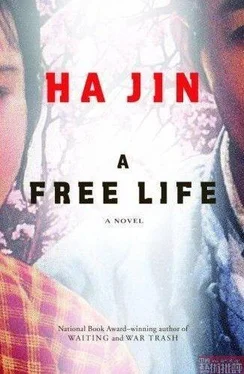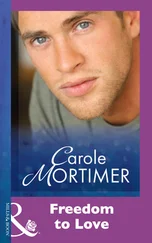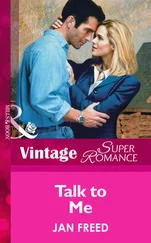Nan borrowed the novel from the town library. Fifteen years ago he had read it in the Chinese translation and had been underwhelmed, mainly because he couldn't grasp it structurally. This time he worked through it carefully and found it magnificent. Pasternak wrote as if no novels had existed before. The loose structure of the book seemed improvident, yet after finishing the last page, Nan felt everything hung together, uncannily unified. What an amazing book! Still, he wished it had shown how the protagonist struggled to write poetry, the development of which was hardly mentioned in the novel. He pondered over the poems at the back of the book and couldn't see how they were related to the content of the prose. He recommended the novel to Pingping. She read a few pages, then gave up. She didn't like the way the story was told, and preferred Steinbeck, whose books she would read whenever she had spare time. Sometimes even if she didn't understand a paragraph fully, she still loved to be lulled by that great author's natural, colloquial voice, just like listening to a wise friend talking.
Over the years Janet, a big fan of Stephen King and Anne Rice, had tried to persuade Pingping to join her book club, but Pingping wouldn't participate. She had very little time, and besides, she liked reading older books.
BOTH Nan and Pingping had gingivitis, a problem common among Asian immigrants because there was little dental care in their native countries. Without dental insurance, the Wus couldn't go to the dentist regularly. Ever since Taotao came to America, they'd had at most one dental cleaning a year. Recently two molars bothered Nan a lot, and the gums in the back of his mouth were inflamed, giving him a sore throat, though he'd had his tonsils out sixteen years before. He went to see Dr. Morell at Sunrise Square near the Lilburn public library, and the dentist suggested Nan have his four wisdom teeth extracted, or he might lose them and some other molars in the near future. The doctor told him, "They won't last, to be sure. All have deep pockets, seven or eight. We should take steps to save your other teeth."
"I don't have dental insurance."
"I'll charge you only two hundred dollars for it."
"Let me talk wiz my wife."
"Sure. Give me a call if you want to do it."
Nan didn't agree on the spot because Pingping disliked Dr. Morell, a pudgy man in his mid-thirties. In the beginning the dentist hadn't been good to the Wus. Once, right before he performed a minor surgery on Pingping's gum, he had said, "So, thirty-seven, eh?" He smirked, his face rippling with flesh. Apparently he'd gotten the information from the form she had just filled out. She angled her head in disgust but said nothing. Throughout the procedure she shut her eyes so she wouldn't have to see his ugly face. Despite that bad experience, she admitted that Morell was skilled, so she would let her family see him once a year.
This time Pingping urged Nan to have his wisdom teeth drawn without postponement. She feared he might fall ill, since the bad teeth often gave him a low fever. He went to the dentist a week later. The extraction wasn't very painful and took less than an hour. Dr. Morell told Nan that his teeth had unusually deep roots. That was why the last tooth alone had taken him almost twenty minutes to pull. Gingerly the tip of Nan 's tongue probed the holes left in the back of his mouth, each of which reminded him of a smoldering bomb crater or volcano. Before leaving the dentist's, he asked for his teeth, which a nurse wrapped for him in a wad of gauze.
Coming out of the office and still in a haze, he looked at his four molars, each of which was ringed with tartar and stained with blood. One still had a tiny piece of flesh attached to it, and another had split in two along the middle, thanks to the force used to extract it. As Nan 's tongue searched the cliffs and valleys in the back of his mouth, a warm pain filled his mind with a strange sensation, which reminded him of a passage in Nabokov's Pnin. Pnin did the same after his dental surgery. The author described his tongue as a fat, sleek seal "plunging from cave to cove" under icy water. In an end-note to the novel provided by the Chinese translator, Nan had read that this passage reflected Nabokov's own experience of having his teeth pulled. Somehow the memory of that passage distressed Nan and made him feel more wretched.
Having parked his car behind the Gold Wok, he unwrapped the gauze and observed the teeth again. Should he keep them? What for? To show them to his wife and son and later to his grandchildren?
Strangely enough, his mind went off on a tangent. He remembered the hearsay that Sakyamuni, the founder of Buddhism, had left two of his teeth on earth. In fact, their whereabouts were still discussed and disputed today. Every few years someone in Asia would proclaim a new discovery of the relic. In China some pagodas were erected to store the sacred teeth said to be Sakyamuni's.
Then Nan 's anesthetic-inspired reverie ran wilder. He envisaged that teeth left by Nabokov, Joyce, Yeats, Frost had all become relics displayed in libraries together with their manuscripts and letters. How precious would their teeth be? How many visitors would pay homage to those tiny things? Some might even touch them in hope that the divine inspiration might rub off on them. This bizarre vision brought tears to Nan 's eyes. He remembered that Keats died at twenty-five, but his gorgeous poetry was still read today. By comparison, he himself had lived only in the flesh. Why should he live like this? What was the meaning of an existence that was altogether bodily?
The more he thought, the giddier he got, something hammering his temples without letup. He looked pale and ill, and he leaned his shoulder against a bit of graffiti on the back wall of the restaurant, a circle of red hearts with a huge lip print in the middle. How valueless his rotten teeth were, because he had accomplished nothing in his life! How ludicrous and megalomaniacal he was to think of the value of his teeth!
Beside him a black lizard with a blue tail zigzagged down the wall and got into a hole beneath the back door of the Gold Wok. A moment later, Nan curbed his teeming mind and warned himself, "This is crazy. Stop this self-pity! These teeth are no different from a dog's." He walked across to the Dumpster and tossed them into it, then went into the restaurant.
At the sight of him Pingping asked, "How do you feel, Nan?"
"All right, a little woozy."
"Your face is narrower now. My God, let me look at you. You're more handsome now!"
Niyan put in, " Nan, you really look better."
He observed himself in the mirror in the men's room. Indeed, with the four big molars gone, his jawline was less squarish than before, and the new smooth contour gave a touch of maturity to his face. Even his chin had a clear angle now. How extraordinary this was! As if he had just received cosmetic surgery-a chin job. He scrunched up his face, then gave himself a mocking grin.
HAILEE suffered a relapse and was hospitalized again. This time the doctor said chemotherapy might not be effective, because after three months' treatment, the cancer cells would have developed resistance to the medicines. Indeed, despite the use of combined drugs, the sign of remission had diminished and then stopped. Instead, a large number of leukemic blasts, young and immature white blood cells, were found in Hailee's blood. The group of doctors in charge of her case recommended a bone marrow transplant, which would have to be done at a larger hospital.
For weeks the Mitchells looked in vain for a donor, who would have to have the same white blood cell proteins as their daughter did. Dr. Caruth at Emory Hospital faxed the description of Hailee's tissue details to the National Bone Marrow Donor Registry in St. Paul, Minnesota, which kept a list of more than a million potential donors, but the center couldn't find a match, partly because only a very small percentage of the registered donors were Asians. According to the literature Dr. Caruth had given the Mitchells, the match rate was much higher among people of the same ethnicity, so Janet asked the Wus if China might also have a program that listed potential bone marrow donors. Pingping called around and even talked with an official at the Chinese consulate in Houston, but nobody had ever heard of such a registry in China. If only the Mitchells could find Hailee's biological parents. They were certain that one of her siblings or cousins might have the tissue type that matched hers.
Читать дальше












